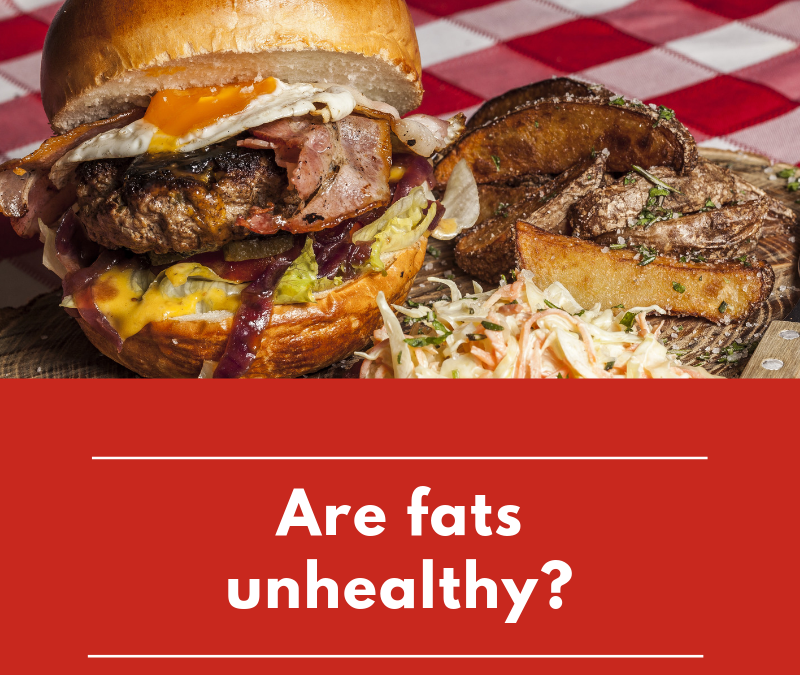Are fats making you fat and killing your gains?
The most used phrase in dieting is that ‘fats make you fat.’ However, this statement needs some backing up from scientific facts to see whether that is true. In this blog post, the fat debacle will be broken down to see whether fats are unhealthy after all.
Before I did some digging, I always assumed that fats were the reason why people would get fat. However, blindly cutting fats in your diet is not the answer to losing weight.
Why fats are important
Let’s start with some facts about fats that explain why fats are vital for the proper functioning of the human body.
Fats give your body energy in the long-run. The first twenty minutes of your workout, you burn mostly carbohydrates in your body to give your muscles strength. After twenty minutes, your body switches its energy source. After those twenty minutes, your body tries to get the most energy from stored fats. Fats are in this case needed to provide your body with energy in more extended cardio/workout exercises.
Fats your body gets via food intake also play a role in brain development; keeping your body warm and blood clotting. Fats are for also used to absorb specific vitamins (like vitamin A, D, E and K). Next, to that, fats take care of your hair and skin to keep it healthy.
Concluding the list stated above, it seems that fats have a lot of important tasks to fulfill in the human body. Cutting too much of fat can disrupt the working of the functions mentioned. Therefore, we should, later on, look at what the appropriate amount of fats are that your body should get daily.
Cardiovascular problems
But first, let’s discuss the downsides of too much fat consumption. Please care that I emphasized on too much. The biggest problem that too much fat uses bring with it is that people get vascular issues when they get older. Their veins narrow down, and they are at risk of having heart failures or even a heart attack. Cholesterol plays an important role here, as well.
I do not want to go too much in detail about this. Prevention is the most vital step here.
Too much fat will cause a lot of cardiovascular problems in the long term. But too much of anything is never good. It is always vital to find the right balance. The dietary reference intake for fat in adults is approximately somewhere between 20% and 35% of total calories taken in a day.
The reason why people who overeat fat gain weight fast is because fats contain more than twice as much calories per gram than carbohydrates and proteins. The ratio is 9:4:4. So 1 gram of fat equals nine calories, 1 gram of carbs equals four calories, and 1 gram of proteins also equals four calories. So when you eat relatively a lot of fats, you see that your calorie intake will increase by a lot. Mind that eventually, the calorie excess intake is what makes you gain weight.
In life, too little or too much is never healthy. It is always about finding the right balance. However, there are different kinds of fats, and you must know the difference between the two.
Types of fats
Well, there are different kinds of fats; one is somewhat healthy, and the other one is said to be rather unhealthy. The classes are saturated fatty acids and (mono-/poly-)unsaturated fatty acids. It is crucial that you mostly get unsaturated fats instead of the saturated ones.
Saturated fats are relatively unhealthy, and you can find them in animal products such as most dairy products and fatty meats. Saturated fats are most of the times solid at room temperature, and it linked with raising levels of LDL cholesterol levels in the blood. I recommend that your daily saturated fat intake is less than 10% of your total daily calorie intake.
Unsaturated fats are considered healthy fats and consist of monounsaturated fats and polyunsaturated fats. Unsaturated fats are liquid at room temperature, and when substituted with saturated fats, it is linked with lowering levels of LDL cholesterol in the blood. It is recommended to eat more monounsaturated fats than polyunsaturated fats. For monounsaturated fats, your daily intake should be about 15-20% of your daily total calorie intake. Your daily intake of polyunsaturated fats should be around 5-10% of your total daily calorie intake.
Conclusion
The most important thing is that you do not think that to cut weight, cutting as many fats as possible is the best thing to do. Gaining or reducing weight is the result of a surplus/shortage of calories. Yes, fats carry more calories with them than carbs. But make sure you cover your basic daily need of fats, with a preference of taking in mostly unsaturated fats and as less as possible saturated fats.
For more information about fats, check out the following links:
https://medlineplus.gov/ency/patientinstructions/000104.htm
https://my.clevelandclinic.org/health/articles/11208-fat-what-you-need-to-know

Recent Comments